Official Newsjournal of the Illinois Council of Health-System Pharmacists

November 2021
Volume 47 Issue 4
Features
History of Organized Hospital Pharmacy in Illinois: 1966-1968
Family Night at the Ballpark – Peoria Chiefs
Columns
College Connections
First Annual Interprofessional Health Fair
Midwestern University College of Pharmacy Photo Collage
More
Officers and Board of Directors
ICHP PHARMACY ACTION FUND (PAC) Contributors
KeePosted Info
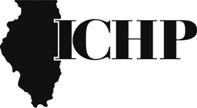
Illinois Council of Health-System Pharmacists
4055 North Perryville Road
Loves Park, IL 61111-8653
Phone: (815) 227-9292
Fax: (815) 227-9294
www.ichpnet.org
KeePosted
Official Newsjournal of the Illinois Council of Health-System Pharmacists
EDITOR
Jacob Gettig
ASSISTANT EDITOR
Jennifer Phillips
MANAGING EDITOR
Scott Meyers
ASSISTANT MANAGING EDITOR
Trish Wegner
DESIGN EDITOR
Amanda Wolff
ICHP Staff
EXECUTIVE VICE PRESIDENT
Scott Meyers
VICE PRESIDENT - PROFESSIONAL SERVICES
Trish Wegner
DIRECTOR OF OPERATIONS
Maggie Allen
INFORMATION SPECIALIST
Heidi Sunday
CUSTOMER SERVICE AND
PHARMACY TECH TOPICS TM SPECIALIST
Jo Ann Haley
ACCOUNTANT
Jan Mark
COMMUNICATIONS MANAGER
Amanda Wolff
LEGISLATIVE CONSULTANT
Jim Owen
ICHP Mission Statement
Advancing Excellence in the Practice of Pharmacy
ICHP Vision Statement
ICHP dedicates itself to achieving a vision of pharmacy practice where:
- Pharmacists are universally recognized as health care professionals and essential providers of health care services.
- Patients are aware of the training, skills, and abilities of a pharmacist and the fundamental role that pharmacists play in optimizing medication therapy.
- Formally educated, appropriately trained, and PTCB certified pharmacy technicians manage the medication distribution process with appropriate pharmacist oversight.
- Pharmacists improve patient care and medication safety through the development of effective public policies by interacting and collaborating with patients, other health care professionals and their respective professional societies, government agencies, employers and other concerned parties.
- Evidence-based practices are used to achieve safe and effective medication therapies.
- There are an adequate number of qualified pharmacy leaders within the pharmacy profession.
- Pharmacists take primary responsibility for educating pharmacy technicians, pharmacy students, pharmacist peers, other health professionals, and patients about appropriate medication use.
KeePosted Vision
As an integral publication of the Illinois Council of Health-System Pharmacists, the KeePosted newsjournal will reflect its mission and goals. In conjunction with those goals, KeePosted will provide timely information that meets the changing professional and personal needs of Illinois pharmacists and technicians, and maintain high publication standards.
KeePosted is an official publication of, and is copyrighted by, the Illinois Council of Health-System Pharmacists (ICHP). KeePosted is published 10 times a year. ICHP members received KeePosted as a member benefit. All articles published herein represent the opinions of the authors and do not reflect the policy of the ICHP or the authors’ institutions unless specified. Advertising inquiries can be directed to ICHP office at the address listed above. Image disclaimer: The images used in the Pharmacy Tech Topics advertisement and the Feature Family Night at the Ballpark are the property of © 2013 Thinkstock, a division of Getty Images.
Copyright © 2013, Illinois Council of Health-System Pharmacists. All rights reserved.
Features
History of Organized Hospital Pharmacy in Illinois: 1966-1968
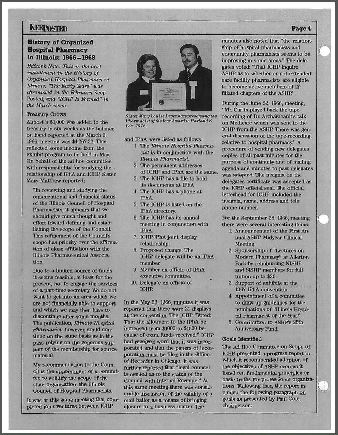 Editor’s Note: This is the next installment in the History of Organized Hospital Pharmacy in Illinois, “The Early Years” was chronicled in the February Keep Posted, and “ICHP Is Formed” in the March issue.
Editor’s Note: This is the next installment in the History of Organized Hospital Pharmacy in Illinois, “The Early Years” was chronicled in the February Keep Posted, and “ICHP Is Formed” in the March issue.Treasury Grows
Almost a $1,000 was added to the treasury in six weeks as the balance on hand reported at the March 3, 1966, meeting was $1,267.32. This reflected some income from the exhibit program to be held in May. On behalf of the ad hoc committee with responsibility for studying the relationship of IPhA and ICHP, Sister Mary Matthew reported:
Due to a limited source of funds it seems feasible, at least for the present, not to engage the services of a part-time secretary. We do not want to get into an area which we are not financially able to support and which we may then have to discontinue after some months. The publication, Illinois Hospital Pharmacist, however, could continue on the same basis as in the past, relying on the generous support of the membership for source material.
My recommendation to the Council is the appointment of a committee to solidify the scope of the state organization, the Illinois Council of Hospital Pharmacists.
- The Illinois Hospital Pharmacist is in conjunction with the Illinois Pharmacist.
- The permanent addresses of ICHP and IPhA are the same.
- The ICHP has a file to hold its documents at IPhA.
- The ICHP has a phone at IPhA.
- The ICHP is listed on the IPhA directory.
- The ICHP has its annual meeting in conjunction with IPhA.
- ICHP-IPhA joint display relationship.
- Proposed change: The ICHP delegate will be an IPhA member.
- Member ex officio of IPhA executive committee.
- Delegate ex officio of ICHP.
In the May 23, 1966, minutes it was reported that there were 21 displays at the convention. The ICHP “Voted: That the allotment to the IPhA be increased from $1000 to $1500 because of extra funds received.” ICHP had received word that the papers of incorporation must be filed in the Office of Recorder in Chicago. It was further reported that “legal counsel is needed as to the status of the Council with Internal Revenue.” At this same meeting there was considerable discussion of the validity of a mail ballot as a means of bringing closure to a business matter. The minutes also noted that “the relationship of hospital pharmacists seems to be improving in some areas.” The delegates voted: “That ICHP inquire ASHP as to whether or not extended care facility pharmacists are eligible to become active members of affiliated chapters of the ASHP.”
During the June 22, 1966, meeting, “Mr. Carlin played-back the tape-recording of Dr. Archambault’s talk on Medicare which was sent to the ICHP from the ASHP. There was general discussion of the tape-recording, relative to hospital pharmacy.” A procedure of sending new delegates copies of all past minutes for the purpose of continuity and of mailing agenda and minutes to past delegates was adopted. The insignia on the delegates certificate was accepted as the ICHP official seal. The official letterhead for ICHP included the insignia, name, address and telephone number.
For the September 28, 1966, meeting there were several interesting items:
- Announcement of the First Annual ASHP Midyear Clinical Meeting.
- Sponsorship of “Lectures on Modern Pharmacy” at Allerton Park by reimbursing NISHP and SISHP members for full tuition up to $20.
- Support of exhibits at the 1967 IPhA convention.
- Appointment of a committee to draw up guidelines for the nominations of “Illinois Hospital Pharmacist of the Year.”
- Contribution to ASHP’s 25th Anniversary Fund.
Goals Identified
The Ad Hoc Committee on Scope of ICHP presented a progress report in which it recommended adoption of the objectives of ASHP even as it listed ten fundamental principles or basic truths for professional organizations. Following that, the report included the following paragraph on goals as presented by Paul Cole, chairperson:
“With these considerations in mind and consistent with the constitutional objectives of the Council, six broad goals can be identified and should be the focus of attention for hospital pharmacists during the next several decades. Coordinated plans must be drawn and implemented to:
- Teach hospital pharmacists by work and precept the philosophy and ethics of hospital pharmacy as one of the healing arts and their personal, individual accountability to assume responsibility for professional practice.
- Strengthen and expand the scientific and professional aspects of the practice of hospital pharmacy, including the consulting role of the hospital pharmacist, his teaching role, and his activities in the field of investigation and research.
- Strengthen and perfect the administrative or management skills and tools essential to the hospital pharmacist in the role of department head.
- Attract a greater number of well-trained pharmacists to hospital practice, including those with specialized education and training in hospital pharmacy.
- Promote payment of realistic salaries to hospital pharmacists in both staff and managerial positions in order to attract and retain the services of career personnel.
- Utilize the resources of hospital pharmacy to assist in the development and improvement of the profession as a whole.
Finally at the April 26, 1967, meeting the mail ballot was approved – the ballot must contain space for a vote FOR_______ AGAINST_______ DISCUSSION_______. A plurality of votes indicated acceptance unless three or more discussion votes were received which meant that a meeting must be held to further discuss the issue at hand. Criteria for the Illinois Hospital Pharmacist of the Year Award were accepted based on criteria for the Harvey A.K. Whitney Award. Minutes throughout these early years of the Council indicated that the ICHP conducted elections for delegates to the ASHP House of Delegates.
An early treasurer’s report appeared in the June 28, 1967, minutes as follows: “Assessments of the Chapters as of June 1, 1967, were sent out last week. The Treasurer’s Report (written and submitted to the secretary) showed:
| Savings | $1,595.40 |
| Checking | 174.58 |
| $1,769.98 | |
| Accounts Payable: |
|
IPhA Journal
|
$500.00 |
IPhA Mailings
|
27.49 |
| $527.49 | |
| Accounts Receivable |
|
SISHP
|
$500.00 |
NISHP
|
210.00 |
| $260.00 |
Treasurer’s Report approved as read.”
That same meeting had some interesting comments concerning the upcoming meeting in St. Louis. Sister Aloysius reported that she had $800 for convention program but program was not completed. ICHP voted: “To invite the hospital pharmacists of the Greater St. Louis Area to attend our ICHP program at the IPhA Convention by sending the invitation to their secretary and asking him to invite their members, to be guests of the IPhA at no charge for tuition.” The minutes continued, “We will rebate $25 to ICHP Chapter members on proof of attendance. Rebates for continuing education need further discussion.”
The September 28, 1967, meeting was held at the Chase-Park Plaza Hotel, St. Louis, Missouri. Minutes from that meeting stated that “an explanation was given by Mr. Strommen concerning the absence of displays at the convention. He declared the readiness of the IPhA to pick up expenses of ICHP speakers and to rebate our active members registration fee.” ICHP voted: “To abolish agreement of the ICHP with the IPhA concerning convention reimbursements. Monies from industry will be deposited in Council Treasury, seminar expenses will be paid by the Council, and rebate to members will be a decision of the ICHP.” Following a discussion of the Council Seminar at the 1968 IPhA Convention to be held September 14-16, 1968, the ICHP voted: “To have a one-day seminar, September 13, 1968, just prior to the IPhA Convention, with free registration for active members of our state ASHP Affiliated Chapters and registration fee set at later day for others.” Thus concluded the first five years of the Illinois Council of Hospital Pharmacists.
– Sister Mary Louise Degenhart, ICHP Historian
Family Night at the Ballpark – Peoria Chiefs

Come join us for some family fun at Dozer Park watching the Peoria Chiefs play against the West Michigan Whitecaps on Saturday, July 20th. The ICHP Central Region is hosting the event. All members and their families are welcome to attend at a special price!
Peoria Chiefs vs. West Michigan Whitecaps
Gates Open 5:30 PM
· Game Time 6:30 PM
Tickets $10 eachJimmy Buffett Night
Come out and celebrate summer with Jimmy Buffett themes throughout the game and stay after for a jersey auction, fireworks, and live concert featuring the Boat Drunks!
The ball park opens at 5:30pm and the game starts at 6:30pm. Dozer Park is located at 730 SW Jefferson in Peoria, IL 61605. (309) 680-4000.
Children 2 years and younger do not need a ticket if they do not need their own seat, however if you would like them to have their own seat you must purchase a ticket for them.
Please note, your ticket price does not include food.
Tickets can be purchased at https://www.ichpnet.org/calendar/event.php?ce_id=332.
Tickets will be mailed to you once your order is processed. We look forward to cheering with you soon! Come enjoy this networking opportunity, and remember to bring your business cards.
Columns
 President's Message
President's Message
If We Only Knew?
by Tom Westerkamp, ICHP President
This compelling video showed a typical day in a hospital, highlighting patients being admitted and recovering from various procedures, and the captions provided insights into the emotional mindset of these patients. There were also visitors portrayed that were worried about loved ones in the hospital, and hospital employees that were worrying about their own personal issues. It ends with a probing question for the viewer that really resonated with me: “If you could stand in someone else’s shoes, hear what they hear, see what they see, feel what they feel, would you treat them differently?”
This certainly applies to each of us regardless of our practice setting. Whether we are in clinical positions with frequent interactions with patients and family members, or administrative positions with less patient contact, or primary responsibilities in distribution, education, or industry, we ALL interact with other people and ALL of us have personal issues that occupy our minds on a daily basis. These personal issues can influence our mindset, our behavior, and our day-to-day emotions. Understanding how these personal issues occupying our minds can affect what we say and do to others can help each of us in our daily lives.
If we could be more empathetic when we deal with others that disagree with us, treat us abruptly, or appear depressed or worried, each of us could be more understanding and compassionate, and less reactive in our personal interactions. Regardless of where we practice, we can incorporate the message from the video into our daily lives. We all interact with people that don’t feel well or are worried about something, either at work, school or home. By trying to remember that patients, family members, hospital staff members and each of us have personal issues that may be causing us to act the way we do, we may be able to better understand the other person’s point of view, and help us act in a more caring way.
Not only would our daily interactions with others be less confrontational, I can’t help but think how much better the world would be if we all could be more empathetic to the needs of others. Easier said than done, I know. I’ll try to remember this the next time I am cut off in traffic!
So when the phone in the pharmacy is ringing off the hook for another “missing” medication or IV, we have yet another presentation to prepare for, another report or evaluation to complete, or another quiz to take, and our anxiety level is elevated, if we could take just a second to remember the message from this video that compels us to try to see the world through the eyes of the other person before our emotions drive our behavior or dictate our response, all of us, and all of our patients, would be better off.
Thanks for caring.
Reference / Link to the video: http://www.hhnmag.com/hhnmag/HHNDaily/HHNDailyDisplay.dhtml?id=7530009619
 Directly Speaking
Directly Speaking
Is Pharmacy Compounding Headed for Its Own Cherry Mine Disaster of 1909?
by Scott A. Meyers, Executive Vice President
Heading north and east in a zigzag pattern having traveled more than 80 miles south and west to get to Malden (northeast of Princeton, Illinois and north of I-80 for those wondering) we quickly saw two significant sized mounds in a small town in the distance that normally indicate a coal mine existed there at one time. As we rounded the curve on Illinois 89 and entered town (Cherry, Illinois) from the south we spotted a large monument (large for a small town anyway) and a sign that read Cherry Miner’s Cemetery. Possessing an i-phone and having heard a little bit about this town from the recommender of Malden’s Feed Store Restaurant, my wife quickly Googled Cherry Mine Disaster and relayed the following story.
In 1905 the Cherry Mine had been opened by the Chicago, Milwaukee and St. Paul Railroad to supply coal for their trains. On November 13, 1909 the mine was operating three horizontal shafts using nearly 500 workers, both men and boys, some as young as 10 years old. The mine was a modern mine using electricity to light it, but the electrical system had failed earlier in the week so the miners were using kerosene lanterns and torches to light their work areas. A coal car full of hay for the mules working the mine was poorly place below a lit torch and soon there was a terrible fire. The mine walls and ceilings were shored up with wooden beams and the coal walls were also flammable. The fire quickly spread out of control and eventually 259 men and boys were lost including 12 rescue workers who made six successful trips into the mine to save trapped miners only to perish on the seventh trip. Twenty-one miners survived in the mine for eight days by walling themselves off from the fire and drinking water that ran from a coal seam.
What happened following the disaster was hugely significant. The next year, the Illinois Legislature established stronger mine safety regulations and in 1911, the General Assembly developed Illinois’, and the nation’s, first Workmen’s Compensation Act. (I guess the General Assembly actually accomplished important things back then!)
The Cherry Mine Disaster is the nation’s third deadliest coal mining accident and until our April field trip, I personally had never heard of it! But now that I have, and have had the chance to reflect how safe, clean and easy my life is, some similarities have come to mind that I hope are worth sharing.
Fast forward to the NECC Disaster of 2012. That debacle has cost 53 lives and infected a total of 733 across 20 states. The causes of this are carelessness and unsafe conditions, just like in the Cherry Mine. Unsafe conditions for the production of the products being manufactured. And at that scale, those products were being manufactured! Because of the NECC Disaster, Congress is now considering sweeping changes to the purview and the powers of the FDA. Multiple State Boards of Pharmacy or related agencies are working to create stricter pharmacy compounding statutes and regulations. Many States already require compliance with USP’s Chapter 797, a recognized national standard. Many hospitals and health-systems are working to achieve compliance to 797 even though their State regulators (like Illinois) don’t require such strict regulation and quality control.
On the other hand, I have been in contact with a physician leader from one of Illinois’ larger health-systems who shared with me that because the State of Illinois does not require compliance to 797-like standards, the health-system’s engineering department will not budget the funds to re-engineer the system’s several hospital pharmacies’ air control systems and facilities to better reach a quality level necessary to provide safe patient care! This is a physician champion not a director of pharmacy! Even working with and for the pharmacy departments and directors together they can’t get the necessary changes made because of the bottom-line. For this health-system and many of the State’s individual hospitals, is something like the Cherry Mine Disaster just around the corner?
Will it take a change in State statute and regulation for your department to move toward safer patient care? Or are you already working toward it or better yet, there? Do others have to die or even suffer needlessly before the changes are made in Illinois and around the country to protect our patients? Or will the changes that are made be the ones we want and need or will the pendulum swing too far and move compounded products out of reach of many who need them?
Let me know where your pharmacy is on the road following the NECC Disaster. Tell me when you reached compliance or why you aren’t making the move toward it right now. Tell me why you can’t or haven’t gotten involved with ICHP’s efforts to draft new regulations for a safer sterile compounding system for Illinois patients. If nothing else, tell me you read this article and learned something about Illinois history today!
Don’t let Illinois hospital compounding experience another disaster like the NECC Disaster! Don’t let Illinois pharmacy have its own Cherry Mine Disaster!
Leadership Profile
Travis Hunerdosse, PharmD, ICHP Director of Educational Affairs
 Where did you go to pharmacy school?
Where did you go to pharmacy school? Drake University
Trace your professional history since graduation: where have you trained / worked, any special accomplishments?
I graduated from Drake where I received my PharmD degree and went on to complete my Pharmacy Practice Residency (PGY-1) at Northwestern Memorial Hospital (NMH) in Chicago. After residency, I stayed on and worked as a clinical pharmacist in critical care and the outpatient HIV clinic. During this time, I also served as the Practice Coordinator and was responsible for the day-to-day operations of the pharmacy satellite. I left NMH to pursue a leadership position as the Manager of Clinical Practice at Fletcher Allen Healthcare, an academic medical center in Burlington, Vermont affiliated with Vermont’s School of Medicine. I did that for 2.5 years then came home to Chicago and worked at RUSH as the Pharmacy Specialist Supervisor for Drug Policy, Procurement, and Utilization. My responsibilities included inventory management, cost saving initiatives, drug shortages and co-chair of the Pharmacy and Therapeutics Committee. I returned to NMH in January of this year as a Pharmacy Manager and have responsibilities for ambulatory oncology services.
Describe your current area of practice and practice setting.
I have only been back at NMH for six weeks, as the Pharmacy Manager for ambulatory oncology services. We have three infusion centers that I manage. I have full operational oversight of infusion centers plus any of the strategic planning. I also co-chair the ambulatory care P&T committee. The committee is only six months old so we have many initiatives to streamline operations, decrease cost, and search for new revenue streams.
What initially motivated you to get involved, and what benefits do you see in being active in a professional association such as ICHP?
When I moved back to the Chicagoland area I wanted to get more involved in professional organizations. My initial exposure to ICHP was through the Annual Meeting Planning Committee, which was chaired by Mike Fotis who was my residency director and Director of Education Affairs at the time. I had a personal connection to someone on the planning committee and that fall I got involved in the Division of Educational Affairs.
As far as the benefits of being active, number one would have to be the networking across ICHP, which can promote a lot of learning. You can learn about the profession and what other people are doing. You can also develop relationships and reconnect with friends from school or old colleagues working at another organization.
What advice would you give to a new practitioner eager to become more involved within ICHP? To the new grad? To the student?
This can apply to all three: Start with easier things to do, join a sub-committee, like the planning committee for the Annual Meeting for example. This is good for all groups because the meeting has programming for all groups so it’s important to have representation on those committees. Little things you can do like submitting an article to KeePosted or serving as a poster reviewer for the Spring Meeting can also be a great start. To summarize, start small and get involved.
I also recommend that folks reach out to ICHP co-workers or preceptors that are ICHP members. Talk to them and find out how they got more involved with the organization and if they know of any opportunities.
Is there an individual you admire or look up to, or a mentor that has influenced your career?
I have worked with many great clinicians and leaders during my career. Each one has contributed to my personal and professional growth. I would have to say Linda Tyler, the Administration Director at the University of Utah, has also been a great mentor and role model. Prior to her current role, she was the director of their Drug Information service. For me, she’s been someone who’s been approachable and great to work with. She’s a great ear to bounce ideas off of and serves as a role model for leadership. She has the qualities of a leader and understands all areas of the pharmacy enterprise, not just one niche. She’s a leader in drug policy, drug information, and started the ASHP drug shortages site. Her DI center handles the maintenance of that site. She’s made the leap to director and I admire the things that she has accomplished.
As a newer practitioner, what is your vision for pharmacy in the future? Or what would you like to able to see accomplished within pharmacy?
What’s facing our profession right now is the ability for pharmacists and technicians to practice at the top of their license. By doing that, I think we can have an influence and be able to extend ourselves to provide better patient care. Right now we may be limited to cover certain services, but I would like to see us be able to cover all patients within the healthcare system. I think we can do this with pharmacists having prescriptive authority and collaborative practice agreements. I would like to see the use of the ‘check tech - check tech’ method to have another technician be able to verify with proper training and education.
What three adjectives would people use to best describe you?
Organized
Focused
Helpful
Do you have any special interests or hobbies outside of pharmacy/work/school? Special accomplishments?
I love to downhill ski and play volleyball all year, indoor and then beach in the summer.
Do you have a favorite restaurant/food?
I wouldn’t describe myself as a foodie but I love trying new restaurants. I like all kinds of food but I think burgers are probably my favorite thing. The Bar on Buena has the best burger in Chicago.
Where is your favorite place to vacation?
I like warm weather but I also like skiing. Hawaii is one of my top destinations, I like the beach and snorkeling and it’s one of the most beautiful places. I don’t think I can pick my favorite place to ski, but I love Aspen and Utah especially Snow Basin.
What is the most interesting/unique fact about yourself that few people know?
Probably the fact that I grew up on a farm in Iowa. Growing up, I was involved in 4H and FFA, and took cattle to the County and State Fair. I also know how to drive a tractor.
Board of Pharmacy Update
Highlights of the May 2013 Meeting
by Trish Wegner, Vice President of Professional Services
Department Updates – Inspections of Illinois compounding pharmacies with out-of-state Iowa licenses are ongoing with no major infractions identified thus far. Should any major violations be found, the IDFPR would open a case and conduct their own inspection. Illinois inspectors are receiving training to become FDA Inspectors. This would allow the IDFPR to discuss and share evidence with the FDA.
The March 2014 renewals will ask that pharmacies indicate if they perform compounding. The IDFPR still has to define what they consider to be a compounding pharmacy.
Pharmacy Technician Renewals – The IDFPR has recently encountered difficulties with their database which has switched student licenses to certified technician licenses. Students should notify the IDFPR if this occurred and they will send a corrected license. Any technician who was incorrectly listed as a certified pharmacy technician should keep a copy of the original license with documentation of actions and send in the original license to the IDFPR. Contact the IDFPR for more specific instructions. The Department hopes to have this corrected before the next renewal.
Board Meeting Schedule for 2013/2014 – The dates for the Board of Pharmacy meetings will be July 9, September 17 (normal sequence change due to a scheduling conflict), November 12, January 14, March 11, May 13. All of the meetings will be held in Chicago, except for the September meeting which will be held in Springfield.
NABP Annual Meeting – Representatives of the Illinois Board of Pharmacy will be attending the NABP 109th Annual Meeting in St. Louis, May 18-21.
Legislative Update – Garth Reynolds of the IPhA provided the Board of Pharmacy with an update of pharmacy-related legislation being considered by the Illinois General Assembly. Refer to “The GAS From Springfield” column for more information.
Next Board of Pharmacy Meeting – is scheduled for July 9, 2013 at 9:30am at the James R. Thompson Center in Chicago. Pharmacists, pharmacy students and pharmacy technicians are welcome and encouraged to attend the open portion of the meeting.
The GAS From Springfield
Are We There Yet? Spring Session Winds Down
by Jim Owen and Scott Meyers
In reviewing the bill with IDFPR staff members we determined that the bill might unintentionally prohibit hospitals from purchasing medications in shortage from one another. ICHP staff quickly drafted a simple one sentence amendment that reads: “(h) Nothing in this Section prohibits one hospital pharmacy from purchasing or receiving a drug in shortage from another hospital in the event of a medical emergency.” The amendment was adopted by the Senate Committee on Licensed Activities and Pensions on May 16th. Whether the bill now moves any further, we are comfortable with the language and the intent.
Additionally, May 17th marked the passage by the Senate of HB001 as written, moving medical marijuana one step closer to reality. All that remains is the Governor’s signature and while he hasn’t shared his intent, this year’s bill is tighter than any of its predecessors and it is anticipated that he will sign it fairly quickly!
The Biosimilars bill, SB 1934 languishes in the Senate with the assurance of the sponsor, Sen. Tony Munoz that he will not move it further unless full agreement is reached. Since the proponents of the bill are not willing to make one single compromise to the language and since the pharmacy profession has already agreed to four of the five items of contention, it is fairly safe to say the bill will die at adjournment. This is not to say it won’t resurface in the future but for the summer it should hopefully be a non-issue.
The General Assembly has less than two weeks left at the time of this writing to handle three very weighty and critical issues, concealed carry of firearms (mandated by the federal courts), State Pension Reform, and the 2014 Budget. These three issues have been debated all session without significant progress but some solution, perhaps lame at best, will be achieved by the May 31 adjournment date. The Democrats have a super majority in both chambers so it would be political suicide to postpone the inevitable until later in June or July. Something will be passed, whatever it is won’t be pretty and our temporary income tax hike of two years ago will probably become permanent! Below is the status of the remaining bills we continue to monitor. Stay informed and involved in the legislative process in Illinois. It is important to your practice and it should be important to you!
HB1052 – Rep. Bradley, D-Marion – Amends the Nurse Practice Act and other Acts but no longer removes references to a written collaborative agreement. It has been amended to allow APNs to provide services the collaborating physician currently provides or could provide. The bill has passed in both Houses and awaits the Governor’s signature.
SB1454 – Sen. Delgado, D-Chicago – Amends the Controlled Substance Act to make Hydrocodone containing products schedule II. Makes changes to the Prescription Monitoring Program in order to make it a better clinical tool. The bill waits on third reading in the Senate with only a limited chance of passage.
SB1741 – Sen. Koehler, D-Peoria – Amends the State Finance Act to sweep funds from multiple dedicated funds into the General Revenue Fund including $2.054M from the Pharmacy Disciplinary Fund, making it almost insolvent. If this one passes, pharmacist and pharmacy licensing fees will undoubtedly be raised quickly! The bill sits in the Senate Appropriations II Committee.
SB1934 – Sen. Antonio Munoz, D-Chicago – Amends the pharmacy practice act regarding the interchange of biosimilar medications. This bill would require the pharmacist to notify the prescriber within 5 business days of any interchange made even though the interchange is approved by the FDA. On third reading in the Senate but should not be called for a vote.
SB2187 – Sen. Don Harmon, D-Oak Park – Amends the Clinical Psychologist Licensing Act to provide specially trained and certified clinical psychologists the ability to prescribe medications. The bill has passed out of the Senate and has been assigned to the House Executive Committee.
HB0001 – Rep. Lang, D-Skokie – Creates the Compassionate Use of Medical Cannabis Pilot Program Act, allowing registered qualifying patient to possess up to 2.5 oz of medical cannabis. It has passed in both the House and the Senate and awaits the Governor’s signature.
HB0011 – Rep. Flowers, D-Chicago – Amended the Pharmacy Practice Act and other Acts and would have require pharmacies that receive State or Federal funds to provide services to the unemployed without reimbursement. It has now been amended in the Senate to remove all unfavorable language and is now a nursing home staffing ratio act that will probably not pass.
HB0084 - Rep. Franks, D-Woodstock – Amends the Wholesale Drug Distribution Licensing Act to prohibit the sale of “drugs in shortage” by any entity other than licensed manufacturers and wholesalers. Awaits final passage by the Senate and then concurrence with the House.
Medication Safety Pearl
Lessons Learned with CPOE Implementation
by Katherine Allen, PharmD, PGY-1 Pharmacy Resident at Presence Health
Part of a twelve hospital health system, Presence Saint Joseph Medical Center (PSJMC) is a 480-bed community hospital located in Joliet, Illinois. Supporting a combination staffing model of decentralized and centralized pharmacists, PSJMC has a pharmacist staff of twenty-one pharmacists and 24 hour coverage for the hospital. As of November 2011, Provena Health and Resurrection Health Care joined to form Presence Health, which led to the creation of a system-wide medication formulary that was implemented in February 2013. At PSJMC, bar-coding medication administration was recently implemented house-wide in December 2012. On March 12, 2013, PSJMC went live with CPOE throughout the entire hospital.
For one year prior to CPOE implementation, various hospital staff from each hospital in the health system, including nurses and pharmacists, attended Meaningful Use meetings to coordinate and organize an effort for a smooth transition from written orders to CPOE. Through these meetings, processes and order-sets were reviewed and approved to help standardize care throughout the health system. Order-sets were developed to standardize evidence-based protocols, such as heart failure and ST elevation myocardial infarction. In addition to evidence-based protocols, standardized order sets, such as patient admission orders and blood transfusion orders, were implemented for physician convenience. These meetings helped facilitate discussion regarding best practices that should be promoted. However, through this process, the healthcare system learned that it was easiest to designate an expert in each specialty area who would be responsible for developing and/or closely reviewing the order sets to ensure accuracy. Also, by adding this extra reminder to physicians, the order-sets have increased adherence to evidence-based recommendations, such as ordering angiotensin converting enzyme inhibitors in patients with heart failure.
In the months immediately preceding the CPOE go-live date, all physicians were required to complete an on-line tutorial covering the basics of order entry, which was followed by a live session with CPOE instructors. During these sessions, physicians had the opportunity to address any specific questions or concerns and go through the order entry process with practice patients. Additionally, there were multiple CPOE superusers on each floor of the hospital who received extensive training and were available to assist physicians directly. All nurses and pharmacists received similar education on CPOE in order to better field questions from physicians once CPOE went live. For four weeks post-implementation, superusers - who included information technology support personnel, nurses, and pharmacists - were available to physicians for elbow-to-elbow support to answer any order entry issues. Although training helped with increasing physician acceptance of transitioning to CPOE, universal provider adherence and approval of CPOE was a significant barrier. By providing adequate support to physicians during the transition period, PSJMC did see an increase in physician acceptance of this new process.
With the implementation of this new process, challenges inevitably have arisen. Moving from pharmacists entering orders to verifying orders, medication errors have been more difficult to identify. Without written orders, it has become more difficult to determine if there is an inconsistency between the original physician order compared to the order after pharmacist verification. There has also been some concern that the physician may enter orders under the wrong patient, which would be difficult to determine with CPOE. In one instance, a physician was entering orders on a patient who had been discharged from the hospital for one week. Through diligence during the pharmacist verification process, these orders were cancelled and the physician was notified of the error. Reinforcing both the importance of pharmacists assessing the appropriateness of a medication order based on the patient’s clinical conditions and the importance of physicians double-checking the patient name has helped in minimizing this challenge.
Another challenge faced with CPOE implementation dealt with product selection issues. Instead of pharmacists selecting the appropriate dosage form, dose, or route, physicians are responsible for making that initial decision. For example, the ceftriaxone 1 gram intravenous product was selected by the physician to be given intramuscularly. Without knowing with certainty what route of administration the physician was intending, the pharmacist had to seek clarification with the provider. Increasing communication with providers and nurses regarding questionable orders has helped ensure accuracy with order verification. Prior to CPOE implementation, pharmacists were typically responsible for selecting the most appropriate start time for medications. When entering orders through the CPOE module, the provider now has this responsibility. At times, this change has lead to inappropriate start times, but discussions with physicians has aided in reducing the occurrence of this error.
Additional errors have stemmed from the cognitive change required of the pharmacists when transitioning from order entry to order verification. Typically, the time required to verify a medication order is less than that required to transcribe an order. With this increase in speed, the potential to miss a possible problem may be greater. Weekly pharmacy patient safety huddles have been implemented to help increase communication throughout the department regarding variances and near-miss issues. Through these meetings, emphasis has been placed on pharmacists to thoroughly review the medication profile prior to verifying new orders so that therapeutic duplication may be prevented. Also, pharmacists have needed to consider physician alert fatigue when verifying orders. In the weekly huddle, pharmacists have been reminded to continue evaluating the appropriateness of a medication by verifying indication, dose, frequency, and route of administration, despite alerts that have been overridden by physicians. However, with the increase in clinical time for pharmacists, there has been an increase in variance reporting and time for counseling patients as part of our heart failure initiative, which ultimately has lead to enhanced patient safety and health benefits.
Challenges are to be expected with any major change in process. Continual evaluation of issues that arise has helped bring attention to and minimize these problems at our institution. From PSJMC’s experience with implementing CPOE, the following factors have helped lead to a smoother transition from paper to computer order entry: requiring provider training on CPOE, providing superuser coverage, training pharmacists and nurses on physician ordering, and developing appropriate order-sets. In addition, during implementation, PSJMC has found that facilitating communication between pharmacy staff through weekly huddles and/or email has helped to identify issues and work to find solutions, as well as, increase awareness in a timely manner. This increased communication has definitely helped prevent further errors. Although there is still room for improvement, persistent notification and education of physicians on how to best enter orders has led to improved provider ordering. At PSJMC, CPOE has helped eliminate transcribing errors due to misinterpretation of physician’s handwriting, which has increased patient safety. In addition to the challenges, the benefits, such as enhanced safety, increased time for pharmacists to complete clinical activities, and improved compliance with The Joint Commission and CMS requirements, have been evident since the implementation of CPOE at PSJMC.
References
- EHR Incentive Programs: Eligible Hospital Information. Centers for Medicare & Medicaid Services. Department of Health and Human Services. Baltimore, MD. Available at: http://www.cms.gov/Regulations-and-Guidance/Legislation/EHRIncentivePrograms/Eligible_Hospital_Information.html. (Accessed 17 Mar 2013).
- How to Implement EHRs: Core Measure 1 – Computerized Physician Order Entry (CPOE) for Medication Orders. The Office of the National Coordinator for Health Information Technology. National Learning Consortium. Available at: http://www.healthit.gov/providers-professionals/achieve-meaningful-use/core-measures/cpoe-meaningful-use. (Accessed 17 Mar 2013).
ICHPeople
| Congratulations to ICHP members Anna Nowobilski-Vasilios, Barb Limburg, Diane Nitzki-George, and ICHP past-president, Caryn Bing (along with Lisa Linn Siefert) on the publication of their book, Extended Stability for Parenteral Drugs, Fifth Edition, featured on ASHP’s Online Marketplace, and available for purchase here. ASHP members save $29. |
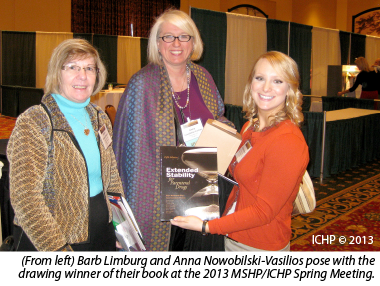 |
| Whoa, Baby! |
|
| Congratulations to ICHP member Kristi Stice who welcomed son, Eli Andrew Stice, born on April 4, 2013, 5 lb 13 oz, 18.5 in long. |
 |
| Congratulations to ICHP member Chris Crank who welcomed son, Thomas Aaron Harmon Crank, born on April 19, 2013, 7 lb 12 oz, 20 in long. |  |
College Connections
First Annual Interprofessional Health Fair
by Gordana Milosevic, PS-3 SSHP Professional Development Chair; Alex Mersch, PS-2; Stephen Jankovic, PS-2, Roosevelt University College of Pharmacy
Harper College students enrolled in professional massage therapy, dental hygiene, and nursing programs were also invited to provide education and services to attendees. Dental hygiene students discussed oral hygiene and its relationship to heart disease, specifically gum disease and prevention/treatments. Nursing students talked about diabetes and the importance of having regular eye and foot exams as a measure to screen for diabetes mellitus complications. Other nursing students set up a booth to assist the pharmacy students with blood pressure screenings.
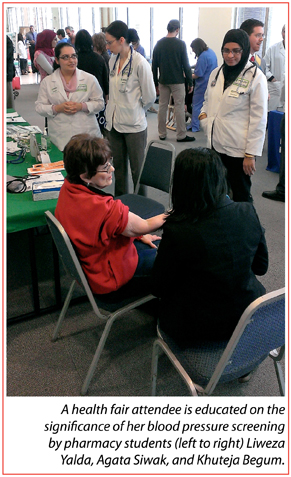 For the diabetes portion of the health fair, students discussed glucose levels, medication adherence, and lifestyle habits with attendees. For example, one of the students had the opportunity to talk to someone with diabetes who did not test their blood glucose regularly. During this conversation, the student was able to explain the importance of regularly testing their blood glucose, and the attendee appeared to be willing to change their testing habits. In addition, various glucose meters were displayed to highlight the differences between meters. Another example of pharmacy-led education was a group discussion about diabetes with both patients and nursing students. For the patients, we discussed how chronically high blood glucose levels could lead to various diseases and complications. Furthermore, students discussed how medications are a vital component in controlling diabetes mellitus type 2. Additionally, pharmacy students discussed oral glycemic agents and insulin response with nursing students, along with common adverse effects associated with diabetes medications.
For the diabetes portion of the health fair, students discussed glucose levels, medication adherence, and lifestyle habits with attendees. For example, one of the students had the opportunity to talk to someone with diabetes who did not test their blood glucose regularly. During this conversation, the student was able to explain the importance of regularly testing their blood glucose, and the attendee appeared to be willing to change their testing habits. In addition, various glucose meters were displayed to highlight the differences between meters. Another example of pharmacy-led education was a group discussion about diabetes with both patients and nursing students. For the patients, we discussed how chronically high blood glucose levels could lead to various diseases and complications. Furthermore, students discussed how medications are a vital component in controlling diabetes mellitus type 2. Additionally, pharmacy students discussed oral glycemic agents and insulin response with nursing students, along with common adverse effects associated with diabetes medications.The COPD portion of the health fair was highly interactive with demonstrations of different types of peak flow meters and inhalers. Pharmacy students educated nursing students on key patient counseling points with regard to the peak flow meters and the inhalers. The nursing students were familiar with inhalers, but indicated that they had not seen them firsthand or been shown how to use them. It is important for the nursing students to get familiar with the inhalers, since they will be interacting and possibly counseling patients on these devices upon discharge. A key learning message for the nursing students was the importance of proper inhalation technique and use of a spacer for patients struggling with their technique.
The health fair provided a wonderful opportunity for open dialogue between two groups of future healthcare professionals. There were 20 attendees at the health fair and of these, 5 (25%) signed the pledge of medication adherence that was provided in conjunction with the Script Your Future campaign. Attendees signed a pledge stating they would take their medications as prescribed. Attendees were given the opportunity to write their own “I will” statement to motivate for improved adherence. This health fair was the beginning of a tradition that is expected to continue at the Roosevelt University College of Pharmacy. In the future, we will continue to work on developing more materials, involving other health care professionals, and including the surrounding community.
Acknowledgements:
Harper College of Nursing, Dental Hygiene, and Therapeutic Massage
Faculty Advisors for the Roosevelt University SSHP (Dr. Fatima Ali), APhA-ASP (Drs. Tara Dymon and Cara Brock) and AMCP (Dr. Meghana V. Aruru) student chapters.
Roosevelt University Community, and the Institute for Continued Learning.
Midwestern University College of Pharmacy Photo Collage
Editor's Note: These images were submitted by the Midwestern University (MWU) College of Pharmacy Student Chapter following publication of their article Brown Bag Medication Review – An Overview and Planning Guide (read article here). The photos were taken at the Brown Bag and Health Fair hosted by MWU at Mayslake Village (an assisted living facility) on February 7th. The last photo was taken at Snow Day, a community event that was hosted by the College of Dental Medicine, that the MWU pharmacy students participated in. Snow Day was held on January 21st and MWU students were in charge of the Fish Bowl Ping Pong Toss booth.
Diabetes Expo 2013
by Jennifer Aguado, PS-2, ICHP-SSHP Chapter President, Rosalind Franklin University of Medicine and Science
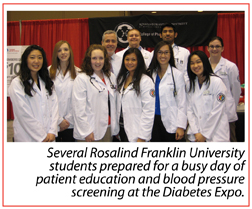 The American Diabetes Association hosts an annual diabetes expo in Chicago, IL. This event is centered around patients with diabetes and empowers them to take charge of their health. Hundreds of people come together every year at the Diabetes Expo to learn about diabetes management and prevention. They can also receive valuable guidance on healthy eating, exercise, and have the opportunity to participate in a variety of health screenings. This event is free of charge, and only requires that the individual register prior to attending. A number of healthcare volunteers, companies, sponsorships, and schools work together in order to make this event a success. There are a number of individuals out there who do not currently have medical/health insurance, and the Diabetes Expo gives these individuals an opportunity to see a healthcare provider and ask them questions.
The American Diabetes Association hosts an annual diabetes expo in Chicago, IL. This event is centered around patients with diabetes and empowers them to take charge of their health. Hundreds of people come together every year at the Diabetes Expo to learn about diabetes management and prevention. They can also receive valuable guidance on healthy eating, exercise, and have the opportunity to participate in a variety of health screenings. This event is free of charge, and only requires that the individual register prior to attending. A number of healthcare volunteers, companies, sponsorships, and schools work together in order to make this event a success. There are a number of individuals out there who do not currently have medical/health insurance, and the Diabetes Expo gives these individuals an opportunity to see a healthcare provider and ask them questions.On April 13th, 2013, students from the Rosalind Franklin University of Medicine and Science College of Pharmacy who have associations with our ICHP-SSHP chapter and the Phi Delta Chi fraternity partnered up with the students from the Dr. William M. Scholl College of Podiatric Medicine to perform several health screenings for the registered attendees. Our school truly values the importance of interprofessionalism, and this event proved to be a perfect example of healthcare teams consisting of more than just one specific profession; it also strengthened our understanding of how these different professions might work together for the common goal of providing excellent patient care.
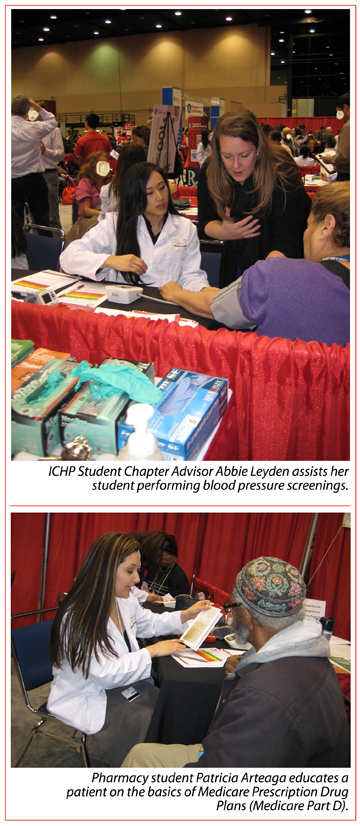 The students from the College of Pharmacy spent the day performing blood pressure screenings and distributing student-made brochures about Medicare Part D. We provided information on blood pressure risk categories as well as education on lifestyle modifications to reduce hypertension such as food choices, mild to moderate exercise, and smoking cessation. For those who had questions, we also educated on the Medicare Part D process, which can sometimes be confusing for patients when deciding on which plan to enroll in or use for reimbursement services.
The students from the College of Pharmacy spent the day performing blood pressure screenings and distributing student-made brochures about Medicare Part D. We provided information on blood pressure risk categories as well as education on lifestyle modifications to reduce hypertension such as food choices, mild to moderate exercise, and smoking cessation. For those who had questions, we also educated on the Medicare Part D process, which can sometimes be confusing for patients when deciding on which plan to enroll in or use for reimbursement services.The effort to organize participation at the Diabetes Expo was one of many major milestones that we accomplished this year as a new ICHP student chapter. Our involvement with the Diabetes Expo this year was as beneficial to our students in the College of Pharmacy at RFUMS as it was for the people in attendance. It was an invaluable experience, as we had an opportunity to meet and speak with over 300 individuals. Through blood pressure screening and education, it is our hope that we made a difference in their perspective on their health. These types of events help to increase patient awareness about the management and prevention of diabetes, which is why it was our pleasure to be of service through our volunteer efforts. Through this opportunity, we were fortunate to have demonstrated the essential role that a pharmacist is making within the community and as part of a healthcare team.
We will continue to strive to meet the goals of achieving optimal health outcomes while advocating and advancing our profession in all healthcare settings. Therefore, we plan to persist with our volunteer efforts at the next Diabetes Expo in Chicago. We would also like to expand our services and potentially take on another health screening, in addition to the blood pressure screening, non-pharmacological recommendations, and Medicare Part D education services we provided this year.
More
Officers and Board of Directors
TOM WESTERKAMP President
224-948-1528
tom_westerkamp@baxter.com
CHRIS RIVERS
Immediate Past President
Chairman, Nominations Committee
708-202-7240
criversrx@gmail.com
MIKE FOTIS
President-Elect
michael.fotis@northwestern.edu
MIKE WEAVER
Treasurer
815-599-6113
mweaver@fhn.org
KATHY KOMPERDA
Secretary
630-515-6168
kkompe@midwestern.edu
TRAVIS HUNERDOSSE
Director, Educational Affairs
Travis_Hunerdosse@rush.edu
EDWARD RICKERT
Director, Government Affairs
618-402-7416
erickert@kdlegal.com
JENNIFER ELLISON
Director, Marketing Affairs
Jennifer.C.Ellison@osfhealthcare.org
JENNIFER PHILLIPS
Director, Professional Affairs
Assistant Editor, KeePosted
630-515-7167
jphillips@midwestern.edu
LINDA FRED
Director, Organizational Affairs
217-383-3253
linda.fred@carle.com
ANN JANKIEWICZ
Chairman, House of Delegates
312-942-5706
ann_m_jankiewicz@rush.edu
ELIZABETH ENGEBRETSON
Technician Representative
815-756-1521x153346
EEngebretson@northshore.org
DAVID TJHIO
Chairman, Committee on Technology
816-885-4649
david.tjhio@cerner.com
JENNIFER ARNOLDI
Chairman, New Practitioners Network
JeArnol@gmail.com
JACOB GETTIG
Editor & Chairman, KeePosted Committee
630-515-7324 fax: 630-515-6958
jgetti@midwestern.edu
DESI KOTIS
Regional Director North
312-926-6961
dkotis@nmh.org
MARK LUER
Regional Director South
mluer@siue.edu
SCOTT BERGMAN
Regional Director Central
scbergm@siue.edu
MARC MCDOWELL
President, Student Chapter
University of IL C.O.P.
marc.mcdow@gmail.com
ALEXANDRA HABANEK
Student Representative
University of IL C.O.P.
ahaban2@uic.edu
CHRIS RADUNZ
President, Rockford Student Chapter
University of IL C.O.P.
radunz@uic.edu
AYUMI ODA
President, Student Chapter Midwestern University C.O.P.
ayumi.oda@mwumail.midwestern.edu
BRANDON ORAWIEC
President, Student Chapter
Chicago State University C.O.P.
borawiec@csu.edu
KRISTINE MAN LIMOS
Student Representative
Chicago State University C.O.P
KmanLimo@csu.edu
KELCEY CORRELL
President, Student Chapter
Southern Illinois University S.O.P
kelceycorrell@gmail.com
ANTHONY ALBIANI
President, Student Chapter
Roosevelt University C.O.P.
aalbiani@mail.roosevelt.edu
JOANNA KASPER
President, Student Chapter
Rosalind Franklin University C.O.P.
joanna.kasper@my.rfums.org
SCOTT MEYERS
Executive Vice President, ICHP Office
815-227-9292
scottm@ichpnet.org
ICHP AFFILIATES
JENNIFER PHILLIPS
President, Northern IL Society (NISHP)
630-515-7167
jphillips@midwestern.edu
JULIA SCHIMMELPFENNIG
President, Metro East Society (MESHP)
jschimmelpfen@sebh.org
MEGAN METZKE
President, Sangamiss Society
memiller8@yahoo.com
ED RAINVILLE
President, West Central Society (WSHP)
309-655-7331x
ed.c.rainville@osfhealthcare.org
Vacant Roles at Affiliates —
President, Rock Valley Society; Southern IL Society; Sugar Creek Society
Welcome New Members!
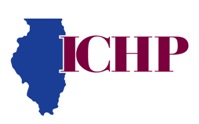
| New Members |
Recruiter |
| Angela Powell |
Jan Keresztes |
| Lisa Ball |
Megan Metzke |
| Roger Ball |
Megan Metzke |
| Joshua DeMott |
|
| Eric Shah |
|
| Clement Ng |
|
| Eunice Park |
|
| Ruchiben Patel |
|
| Heather Koehn |
Megan Metzke |
| Zheni Stoyanova |
|
| Natasha Burgener |
|
| Kristen Dabkey |
|
| Haesook Yang |
|
| Jeong Beom |
|
| Ashlie Kallal |
|
| Tim Cresson |
ICHP PHARMACY ACTION FUND (PAC) Contributors
GENERAL ASSEMBLY GUILD - $1000 & More Scott Bergman
Dan Ciarrachi
Kevin Colgan
Edward Donnelly
Andrew Donnelly
Dave Hicks
ICHP
James Owen Consulting Inc.
Frank Kokaisl
Scott Meyers
Michael Novario
Michael Rajski
Edward Rickert
Michael Short
Carrie Sincak
Avery Spunt
Michael Weaver
Patricia Wegner
Thomas Westerkamp
SPRINGFIELD SOCIETY - $500-$999
Jered Bauer
Ginger Ertel
Kenneth Foerster
Linda Fred
Ann Jankiewicz
Jan Keresztes
Kathy Komperda
Leonard Kosiba
Despina Kotis
Richard Lewis
Huzefa Master
John & Joycelyn McCann
William McEvoy
Anna Nowobilski-Vasilios
Christina Rivers
Miriam Smith-Mobley
JoAnn Stubbings
Cathy Weaver
Paul Zega
CAPITOL CLUB - $250-$499
Sheila Allen
Margaret Allen
Peggy Bickham
Jaime Borkowski
Timothy Candy
Rauf Dalal
Drury Lane Theater
Sandra Durley
Starlin Haydon-Greatting
Vern Johnson
George MacKinnon
Janette Mark
Heather Minger
Jennifer Phillips
Edward Rainville
Jennifer Rogers
Kathryn Schultz
Heidi Sunday
Jill Warszalek
Alan Weinstein
LINCOLN LEAGUE - $100-$249
Tom Allen
Anonymous
Jen Arnoldi
Jerry Bauman
Jill Borchert
Se Choi
Scott Drabant
John Esterly
Nancy Fjortoft
Nora Flint
Michael Fotis
Jacob Gettig
Gireesh Gupchup
Joann Haley
Joan Hardman
Travis Hunerdosse
James Jansen
Zahra Khudeira
Mary Lee
John LeGrand
Kristopher Leja
Phyllis Lulinski
George Lyons
Gloria Meredith
MWU COP Student Chapter
Peggy Reed
Katie Ronald
Rochelle Rubin
Don Shadensack
Kristi Stice
GRASSROOTS GANG - $50-$99
Sean Chantraparout
Jordan Cohen
Mark Deaton
Rhonda DePasquale
Glenna Hargreaves
Lois Honan
Charlene Hope
Diana Isaacs
Gerald Jablonski
Kim Janicek
Dwaine Keller
Colleen Kielch
Kati Kwasiborski
Kim Lim
Mark Luer
Scott Metzger
Shannon Pace
Douglas Shafer
Barbara Smith
Lucas Stoller
Carrie Vogler
Marie Williams
CONTRIBUTOR - $1-$49
Daniel Abazia
Nitika Agarwal
Pat Bagnara
Brett Barker
Elvira Becker
Kathy Brandon
Amanda Bryant
Christina Corcoran
Maricar Curry
Colleen Czerniak
Gabrielle Daniels
Agnes Dominic
Judy Douglas
Jeanne Durley
Kathy Eakright
Karen Eckhart
Lisa Edmond
Lara Ellinger
Jennifer Ellison
Brooke Griffin
Milena Griffith
Susan Hamilton
Eva Hurth
Richard Januszyk
George Jossel
Alex Lomahan
Bella Maningat
Sarah Matias
Ann Marie McDermott
Lindsay McNeely
Virginia Nash
Karen Nordstrom
Walter Ogle
Gopi Patel
Dina Porro
Jeremy Raschke
Jolee Rosenkranz
Jeri Rothman
Mark Ruscin
Ann Ryan
Kim Scarsi
Allison Schriever
Wade Seggerman
Jennifer Splawski
Brandi Strader
Kodanda Uppuluri
Ellen Voelker
Shari Weyland
Laura Woskobnick
Izabela Wozniak
Upcoming Events
Tuesday, June 4Sangamiss CPE Live Program: The “Ins” and “Outs” of an Inpatient Pharmacy Care Transition Program
Springfield, IL
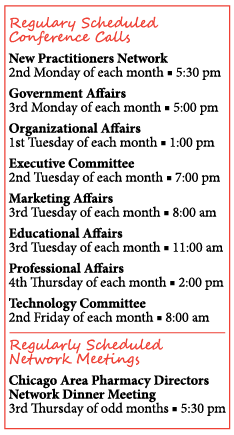 Friday, June 14
Friday, June 14Deadline to apply to be a Judge for the Best Practice Award 2013
Monday, July 1
Submission Deadline: Best Practice Award 2013
Saturday, July 20
Family Night at the Ballpark – Peoria Chiefs
Dozer Park | Peoria, IL
Wednesday, July 24
Pharmacy Directors Network Dinner
Via Carducci | Chicago, IL
Saturday, July 27
Certificate Training Program for Pharmacists: Pharmacy-Based Immunization Delivery
Springfield, IL
Sunday, July 28
Certificate Training Program for Pharmacists: Delivering Medication Therapy Management Services
Springfield, IL
Thursday, September 19 – Saturday, September 21
ICHP Annual Meeting
Drury Lane Theatre and Conference Center | Oakbrook Terrace, IL
Friday, September 20
Save the Date! ICHP 50th Anniversary Gala
Drury Lane Theatre and Conference Center | Oakbrook Terrace, IL
Tuesday, October 15
Submission Deadline: 2013 ICHP Student Chapter Video Contest
 578x100.png)
